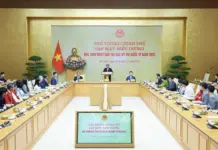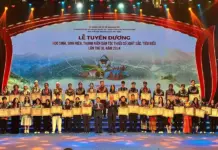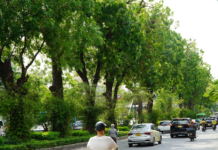A homestay feels like home
“It was a late morning in 2018, although my mother tried to call me back to give me some money, but in my frustration because of an argument with my father the night before, I left with only VND500,000 in my pocket. I went to Sa Pa to learn English.”, Phin smiled and told us.
Born and raised in a poor family in Lung Hoa B Village, Sa Phin Commune, Dong Van District, Ha Giang Province, Sung Mi Phin was born in 1994. He gave up his job as a teacher, which is a job his parents liked, to move to the travel industry. Once a teacher, Phin understands that those in tourism must have knowledge and foreign languages.
Through YouTube, Phin knew that Tan Thi Su’s Sapa O’Chau Social Enterprise in Sa Pa, Lao Cai Province, supported ethnic minority children to learn English for tourism free of charge. Phin contacted Su. After hearing Phin’s story, Su accepted to free teach Phin and provide free accommodation.
Ignoring the self-esteem and shame of learning English with young children, for eight months, Phin applied to work as a waiter, receptionist, tour guide for more expenses and opportunities to improve your English and expand your knowledge of tourism. In 2019, Phin said goodbye to Sa Pa in the rocky plateau, and started to travel in the way that Phin wanted.
In that year, Phin begged his mother to sell the cattle for VND40 million and coordinated with his brother to open a homestay in the centre of town. But then, as Phin shared: “Instead of a modern house, Phin wants the homestay have indigenous elements and culture of his ethnic group”. And Phin’s “White H’mong Homestay”, which means the homestay of the White Man – a group of the H’Mong people, was born.
Homestay offers guests a sense of freedom as if they were at home. Visitors to this homestay will start the day and end the day like real locals. Early in the morning, they would go to the fields to cut grass, pick vegetables, grow corn; in the afternoon they would weave fabric, cook and eat traditional dishes together, and share and enjoy everyday stories, Phin said. Visitors keep telling each other about this ‘true homestay’. Each month, minus all expenses, Phin earns approximately VND10 million.
Hoping to add more Chai”to
According to Vice Chairman Dong Van District People’s Committee Nguyen Van Chinh, the district appreciated and encouraged the development of the Phin’s homestay model. In Dong Van ancient town or some cultural villages, such as Lo Lo Chai (Lung Cu) or Lung Cam at Sung La Commune, have advantages to create homestays because they still retains the original ethnic traditional architecture. The Vice Chairman appreciated Phin’s determination.
At Phin’s age, many young people are either married or work away from home, but Phin chooses to path to the homeland. In order to develop sustainable tourism, it is necessary to start from the media culture, by the people themselves. Phin has created a project called “Chai”to” (Fighting) with the desire to bring local people into the main factor in tourism development. The project focuses on fields such as experience tours, car rental, homestay. Profits from the services will be used for social purposes such as teaching English to homestay owners and local people, and helping the community solve tourism problems.
Nguyen Van Chinh assessed: “The project is very feasible according to the tourism development orientation of Dong Van. I exchanged ideas with the Secretary of the District’s Youth Union to find ways to support and develop models like Phin’s”.
“My wish is to open a centre like Tan Thi Su’s Sapa O’Chau in Ha Giang” Phin shared.
Recently, the Chai”to project of Sung Mi Phin has won the second prize of the 6th start-up contest for rural youngsters organised by the Central Committee of the Ho Chi Minh Communist Youth Union and was highly appreciated by experts.




